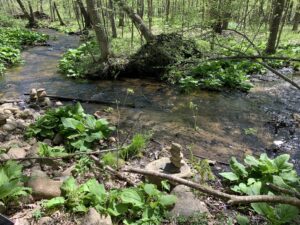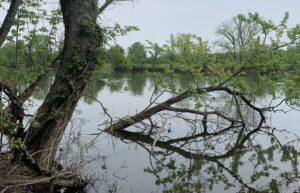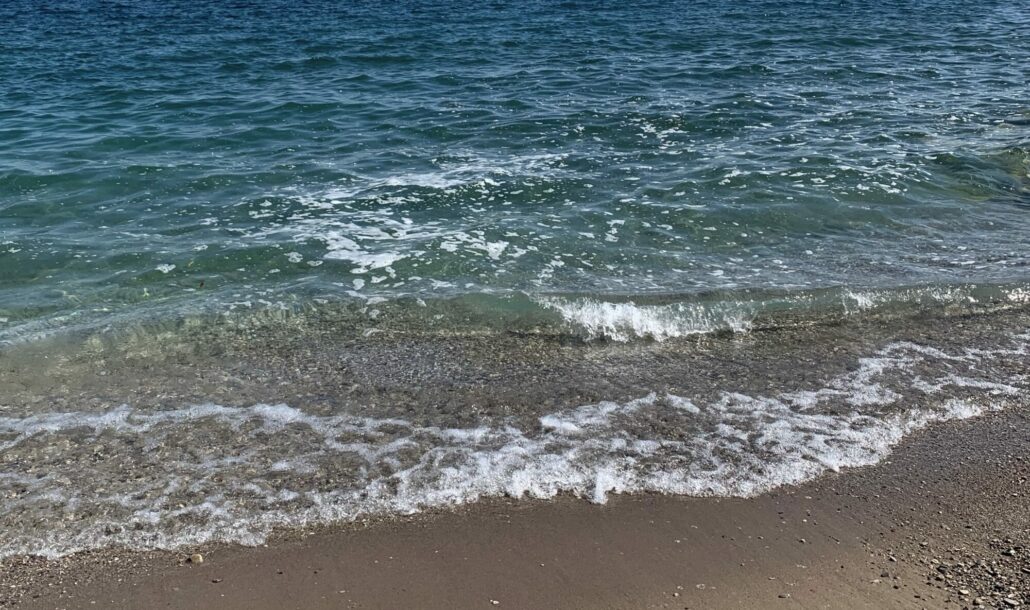By: Lindsey Schmidt, Eco-Journalism and Blogging Intern
The Great Lakes make up about 20% of the world’s surface freshwater. Michigan’s boundaries encapsulate about 38,000 square miles of the Great Lakes’ total surface area of about 94,250 square miles. Additionally, Michigan has 62,798 inland lakes, 11,037 of which are greater than five acres in size. Michigan also has more than 36,000 miles of rivers and streams, 6.5 million acres of wetlands, and 1,233 public beaches. Groundwater supplies about 45% of Michigan’s population with drinking water. In short, Michigan has access to and relies upon a vast network of freshwater. Thus, it is vital that we strive to prevent our lakes, rivers, and streams from being tainted by the many threats to freshwater systems, which include invasive species, urban and rural runoff, historical and new sources of contamination, and changes in climate.
 Since the early 2000s, Great Lakes and Freshwater Week has taken place during the first week of June. Each year, the governor issues a formal proclamation. In her proclamation this year, Governor Whitmer stressed how freshwater is essential to Michiganders’ livelihoods and connects us via industries such as recreation, tourism, fishing, manufacturing, transportation, and agriculture: “Water links our communities to places and environments beyond our borders, and Michigan must be a leader in protecting this complex and unique ecosystem and resource.” Great Lakes and Freshwater Week is meant to “encourage Michiganders to learn more about the unique wonders of our Great Lakes and freshwater resources vital for Michigan’s future.” This year, Great Lakes and Freshwater Week was sponsored by the Department of Environment, Great Lakes, and Energy (EGLE) and the Department of Natural Resources. Throughout the week of June 3 through June 11, there were a variety of events available for Michiganders to participate in, including webinars, trash runs, festivals, and kayak races.
Since the early 2000s, Great Lakes and Freshwater Week has taken place during the first week of June. Each year, the governor issues a formal proclamation. In her proclamation this year, Governor Whitmer stressed how freshwater is essential to Michiganders’ livelihoods and connects us via industries such as recreation, tourism, fishing, manufacturing, transportation, and agriculture: “Water links our communities to places and environments beyond our borders, and Michigan must be a leader in protecting this complex and unique ecosystem and resource.” Great Lakes and Freshwater Week is meant to “encourage Michiganders to learn more about the unique wonders of our Great Lakes and freshwater resources vital for Michigan’s future.” This year, Great Lakes and Freshwater Week was sponsored by the Department of Environment, Great Lakes, and Energy (EGLE) and the Department of Natural Resources. Throughout the week of June 3 through June 11, there were a variety of events available for Michiganders to participate in, including webinars, trash runs, festivals, and kayak races.
If you missed or were unable to attend these events, WMEAC offers opportunities for people to contribute to the safety of our freshwater systems all year long. For beginner conservationists, WMEAC offers rain barrel workshops, during which individuals can learn how to effectively save rainwater and use it to water their gardens. These workshops are held six to ten times a year during the growing season (April through October). WMEAC also offers rain garden consultations. If you are interested in cultivating a rain garden at your home or on your business’s property, WMEAC staff members will come to your location to perform a site assessment. You can learn where on your property would be most conducive to a rain garden, what types of plants match your property type, and how to conserve and maintain your rain garden. If you would like to help but don’t have the means to cultivate your own rain garden, WMEAC offers volunteer opportunities in which people can help maintain the rain garden located on WMEAC’s property. WMEAC also offers assistance to those interested in taking on more large-scale green infrastructure projects, such as green roofs and permeable pavement.
Other actions people can take through WMEAC to contribute to freshwater conservation include participation in services such as Adopt-a-Stream and Adopt-a-Drain or events such as the Mayor’s Grand River Cleanup. Through Adopt-a-Stream and Adopt-a-Drain, individuals or businesses can help protect our freshwater systems by contributing to the cleanup of streams and drains. Through events such as the Mayor’s Grand River Cleanup, people can learn how to identify and correctly dispose of trash that ends up in our freshwater sources.
 Outside of events, workshops, and volunteer work, WMEAC recommends steps people can take in their daily lives in order to positively contribute to the conservation of our freshwater sources. Firstly, it is important to be educated about the watershed that you live in. A watershed is the area of land that drains into a body of water. There are 63 major watersheds in Michigan, and each has unique concerns due to differing landscape and infrastructure. You can find your own local watershed or subwatershed through the Lower Grand River Organization of Watersheds or the U.S. Environmental Protection Agency. Being educated about the watershed that you live in will allow you to be aware of the steps you can take to help preserve that watershed and may make you more aware of community-specific events that promote the conservation of your watershed. Other steps people can take are to replace your lawns with native plants, decrease your use of pesticides or abide by the regulations on the label, get your soil tested for nutrient levels, and lessen your daily water usage.
Outside of events, workshops, and volunteer work, WMEAC recommends steps people can take in their daily lives in order to positively contribute to the conservation of our freshwater sources. Firstly, it is important to be educated about the watershed that you live in. A watershed is the area of land that drains into a body of water. There are 63 major watersheds in Michigan, and each has unique concerns due to differing landscape and infrastructure. You can find your own local watershed or subwatershed through the Lower Grand River Organization of Watersheds or the U.S. Environmental Protection Agency. Being educated about the watershed that you live in will allow you to be aware of the steps you can take to help preserve that watershed and may make you more aware of community-specific events that promote the conservation of your watershed. Other steps people can take are to replace your lawns with native plants, decrease your use of pesticides or abide by the regulations on the label, get your soil tested for nutrient levels, and lessen your daily water usage.
Great Lakes and Freshwater Week is a great way to educate the public about Michigan’s freshwater systems and how we can conserve them. If you were able to participate in any of the events, you are encouraged to spread the word via the hashtag #MIGreatLakesWeek. For those of you who wish to extend your contributions to water conservation beyond just one week each year, WMEAC offers many opportunities for local individuals and businesses to learn about conservation as well as many easy suggestions for people to adopt in their day-to-day lives. Michiganders rely upon our freshwater systems, and it is imperative that we all do our part to conserve them.

